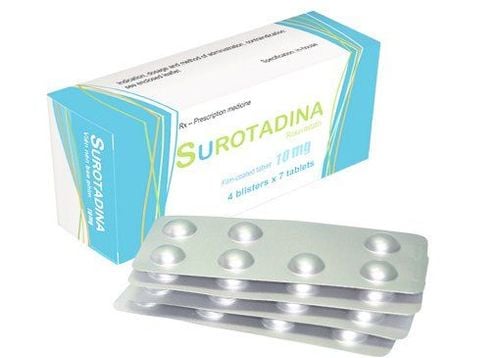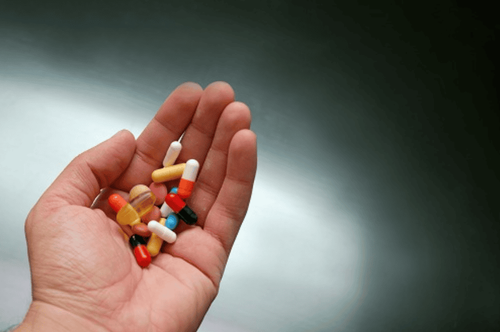This is an automatically translated article.
Lipisans 160 drug has the ingredient Fenofibrate 160 mg, which is a derivative of fibric acid. The drug belongs to the group of drugs that regulate plasma lipids, which is used in the treatment of dyslipoproteinemia of types IIa, IIb, III, IV, V in combination with a lipid-restricted diet. For more information about the drug, please read the information below:
1. What is Lipisans 160?
Lipisans 160 is a drug for the treatment of dyslipidemia with the main ingredient being Fenofibrat 160mg, content of 160mg, prepared in the form of long film-coated tablets. Fenofibrate is a derivative of fibric acid with lipid-regulating effects in plasma. Drugs that inhibit cholesterol biosynthesis in the liver reduce atherogenic components: very low-density lipoprotein VLDL and low-density lipoprotein LDL, increase the production of high-density lipoprotein (HDL) and reduce blood triglycerides. Therefore, the drug has the effect of significantly improving the distribution of cholesterol in the blood plasma. Findings: Fenofibrate can reduce 20-25% total cholesterol and 40-50% blood triglycerides. For the treatment to be effective, it is necessary to use Lipisans 160 continuously.Lipisans 160 is readily absorbed from the gastrointestinal tract with food. This absorption is greatly reduced if taken after an overnight fast.
Peak plasma concentrations occur about 5 hours after dosing. In subjects with normal renal function, the plasma half-life is about 20 hours. This time is greatly increased in people with kidney disease, and fenofibric acid accumulates significantly in people with renal failure who take fenofibrate daily. Fenofibric acid is excreted mainly in the urine as a glucuronic conjugate, in addition to fenofibric acid in the reduced form and its glucuronic conjugate.
2. What are the effects of Lipisans 160?
Lipisans 160 is indicated in the treatment of: dyslipoproteinemia types IIa, Iib, III, IV, V in combination with diet.
3. Contraindications of Lipisans
Contraindications of Lipisans drug in the following cases:
Hypersensitivity to the components of Lipisans drug. People with severe liver and kidney failure. Children under 10 years of age should not take this medicine.
4. Dosage - how to use Lipisans
How to use : You should take the medicine during or immediately with a meal with a full glass of water, the patient swallows the tablet whole, does not chew or crush the medicine. In combination with a lipid-restricted diet.
Dosage:
Adults: 1 tablet/day Renal impairment: starting dose 54mg/day, increase dose only after assessing the effect of the drug on renal function and blood lipid concentration after this dose. Note that in case you overdose, you need to immediately notify your doctor or go to the nearest medical agency for timely support and treatment. In case of overdose, the doctor may consider treatment with hemodialysis and symptomatic treatment in this case.
5. Undesirable effects when using Lipisans
Unwanted effects while using the drug are usually mild and uncommon, including:
Common:
Digestive disorders, bloating, nausea, mild diarrhea. Patients should stop taking the drug, then immediately notify the doctor for timely treatment. Skin rash, urticaria, non-specific rash: Should immediately report to the doctor for timely resolution. Increased blood transaminase levels, muscle aches. Rare:
Cholelithiasis - this condition is more common in patients with a history of cirrhosis, gallstones before. Decreased sex drive, impotence, decreased sperm count and white blood cell count. Pancreatitis has been reported in patients receiving fenofibrate. Pancreatitis can also result from ineffective treatment in patients with severe hypertriglyceridemia. Treatment with fibrates is rarely associated with rhabdomyolysis, which is more common in patients with impaired renal function. Myopathy should be considered in any patient with diffuse myalgia, muscle weakness, and markedly elevated serum creatine phosphokinase levels.
6. Notes when using Lipisans
You need to inform your doctor about your previous diseases, history of allergies to drugs, foods; medications you are taking, as the use of other medications while taking Lipisans may affect the effectiveness of these and Lipisans. For example, drugs such as: Do not combine drugs with hepatotoxicity and fenofibrate such as MAO inhibitors, perhexiline maleate,... with fenofibrate; Lipisans 160 should not be combined with other fibrates, HMG Co-A reductase inhibitors, cyclosporin, because it will increase adverse effects on muscle. Especially if you are taking anticoagulants, it is important to inform your doctor immediately for specific instructions on its use, as Lipisans may increase the effect of anticoagulants and increase the likelihood of bleeding. blood. Therefore, you should monitor your prothombin levels more often and adjust the dose of your oral anticoagulant during treatment with fenofibrate and 8 days after stopping it. You should have your liver and kidney function checked before treatment. decided to take Lipisans. If you take the drug at a dose of 107-160 mg / day, this drug may increase serum transaminases. Therefore, you need to be monitored for transaminases every 3 months during the first 12 months of taking the drug, when SGPT > 1000 UI you have to stop taking the drug. If, after 3-6 months of treatment, your blood lipids have not decreased, it can be supplemented or replaced with other therapies according to the instructions of the treating doctor. The use of fibrates alone, such as Lipisans, sometimes causes myopathy. You should tell your doctor right away if you have any unexplained muscle pain or weakness, especially if you are accompanied by fatigue or fever. CK levels should be evaluated in these symptomatic patients and fenofibrate therapy should be discontinued if significant elevations in CK levels or myopathy have been diagnosed. Pregnant women should not use during pregnancy. Breastfeeding women should not take the drug, because the safety of the drug when used in nursing women has not been established. The drug does not affect the nervous system, so you can still drive and perform tasks that require high concentration. Lipisans is a drug to treat dyslipidemia, because side effects of the drug during use may occur, so you need to consult your doctor before using the drug. The above is some information about the drug, if you have any questions, you can contact your doctor for more information.
Follow Vinmec International General Hospital website to get more health, nutrition and beauty information to protect the health of yourself and your loved ones in your family.
Please dial HOTLINE for more information or register for an appointment HERE. Download MyVinmec app to make appointments faster and to manage your bookings easily.













